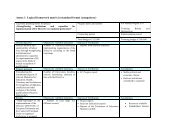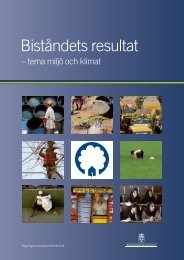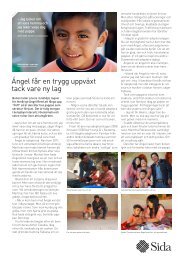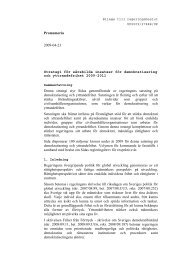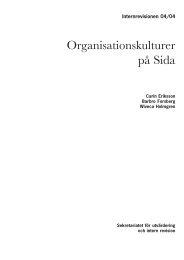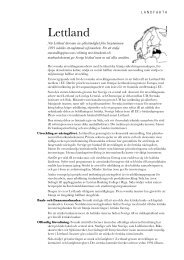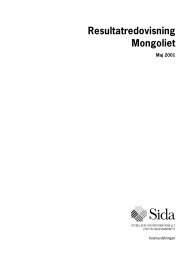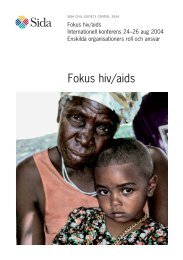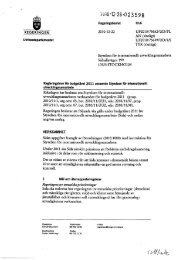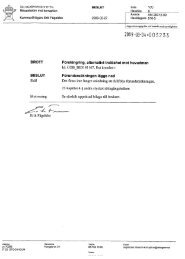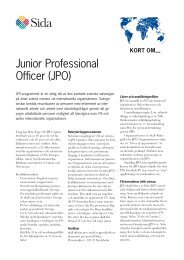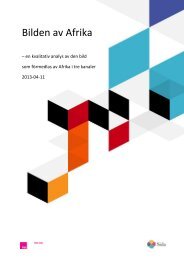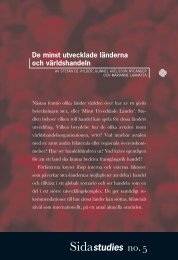Mid-Term Review of the AGIR Programme - Sida
Mid-Term Review of the AGIR Programme - Sida
Mid-Term Review of the AGIR Programme - Sida
You also want an ePaper? Increase the reach of your titles
YUMPU automatically turns print PDFs into web optimized ePapers that Google loves.
A N N E X 3 – I N C E P T I O N R E P O R T<br />
Recommendations on scope<br />
Since <strong>the</strong> <strong>AGIR</strong> programme is still in its early formative years and <strong>the</strong>re is <strong>the</strong> real<br />
possibility that <strong>the</strong> capacity streng<strong>the</strong>ning processes may have not, as yet, achieved<br />
<strong>the</strong> intended but long-term ‘outcomes’, <strong>the</strong> evaluation team recommends a focus on<br />
<strong>the</strong> identification and assessment <strong>of</strong> outcomes at <strong>the</strong> immediate and intermediate<br />
level <strong>of</strong> <strong>the</strong> capacity development process.<br />
The evaluative assessment <strong>of</strong> <strong>the</strong> mid-term review will have a primary focus on <strong>the</strong><br />
CSO partners involved in <strong>the</strong> <strong>AGIR</strong> programme. It is at this level that <strong>the</strong> achievement<br />
<strong>of</strong> programme ‘outcomes’ is expected. A critical part <strong>of</strong> <strong>the</strong> evaluation will be<br />
<strong>the</strong> information collected through semi-structured interviews with selected CSO partner<br />
organisations, examining both internal and external capacity <strong>of</strong> <strong>the</strong> CSO partner<br />
organisations and <strong>the</strong>ir work in <strong>the</strong> <strong>AGIR</strong> programme. Out <strong>of</strong> <strong>the</strong> total <strong>of</strong> <strong>the</strong> current<br />
47 partners it is suggested that 8-10 are to be selected for in-depth semi-structured<br />
interviewing. A set <strong>of</strong> criteria is proposed to guide <strong>the</strong> selection <strong>of</strong> <strong>the</strong>se partners.<br />
A key component <strong>of</strong> <strong>the</strong> evaluative review will be an examination <strong>of</strong> <strong>the</strong> partnership<br />
strategies used by <strong>the</strong> intermediaries, which will be critical to assessing <strong>the</strong> sustainability<br />
<strong>of</strong> <strong>the</strong> programme and <strong>the</strong> ability <strong>of</strong> <strong>the</strong> intermediaries to continue with <strong>the</strong> level<br />
<strong>of</strong> support that <strong>the</strong>y currently provide to <strong>the</strong>ir CSO partners.<br />
Proposed Approach and Methodology<br />
The proposed approach in this inception report will focus its evaluative analysis on<br />
issues <strong>of</strong> capacity streng<strong>the</strong>ning, partnership development, monitoring and reporting<br />
processes and <strong>the</strong> effectiveness <strong>of</strong> <strong>the</strong> programme. These will be addressed using <strong>the</strong><br />
evaluative criteria <strong>of</strong> relevance, efficiency, effectiveness, sustainability and impact.<br />
A central perspective taken by this evaluation is that <strong>the</strong>re are multiple ‘spheres <strong>of</strong><br />
influence’ in <strong>the</strong> <strong>AGIR</strong> programme that are linked toge<strong>the</strong>r through relationships between<br />
donors and intermediaries, intermediaries and partner CSOs, and CSOs and<br />
<strong>the</strong>ir own partners in <strong>the</strong> communities in which <strong>the</strong>y work. Given <strong>the</strong> structure <strong>of</strong> <strong>the</strong><br />
<strong>AGIR</strong> programme (one programme with sub-programme intermediaries partnering<br />
with local CSOs) and its focus on capacity streng<strong>the</strong>ning processes, a clear understanding<br />
<strong>of</strong> <strong>the</strong> different ‘spheres <strong>of</strong> influence’ within <strong>the</strong> <strong>AGIR</strong> programme is necessary<br />
to identify and assess outcomes related to <strong>the</strong> programme approach. Identifying<br />
and documenting <strong>the</strong> ‘change pathways’ and outcomes associated with this capacity<br />
streng<strong>the</strong>ning process <strong>of</strong> CSOs will be central to understanding <strong>the</strong> progress, to date,<br />
<strong>of</strong> <strong>the</strong> <strong>AGIR</strong> programme and its ability to sustain this progress in <strong>the</strong> near and longterm<br />
future.<br />
The approach to <strong>the</strong> evaluation will require evidence collecting in both Maputo and in<br />
<strong>the</strong> provinces <strong>of</strong> Mozambique where many <strong>of</strong> <strong>the</strong> CSO partners work. The two main<br />
sources <strong>of</strong> evidence to be used in this evaluation will be <strong>the</strong> review <strong>of</strong> programme<br />
documentation at <strong>the</strong> donor, intermediary and CSO partner level, and <strong>the</strong> use <strong>of</strong> information<br />
ga<strong>the</strong>red primarily through interviews with individuals at <strong>the</strong> donor, intermediary<br />
and CSO partner levels.<br />
86



